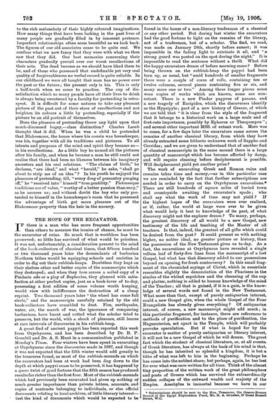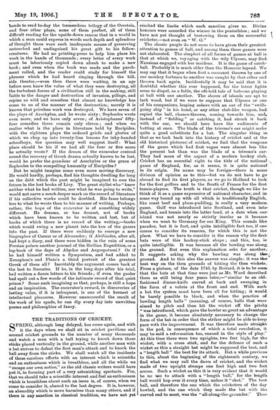THE HOPE OF THE EXCAVATOR.
IF there is a man who has more frequent opportunities than others to measure the ironies of chance, he must be the excavator of ruins. So much that is worthless has been preserved; so little has survived of what would be priceless. It was not, unfortunately, a consideration present to the mind of the book-collectors of classical times, that fifteen hundred or two thousand years later the descendants of barbarian Northern tribes would be equipping schools and societies in order to dig out their rubbish-heaps. Doubtless they kept on their shelves other and better copies of the manuscripts which they destroyed; and when they tore across a soiled copy of a Pindaric ode or a play of Sophocles, they glanced with satis- faction at other perfect copies, just as a book-lover of to-day, possessing a first edition of some volume worth keeping, would view with indifference the destruction of a cheap reprint. Two thousand years later " the wheel has come full circle," and the manuscripts carefully retained by the old book-collectors have crumbled to dust. Fire, earthquake, water, air, the march of war, the ignorance of conquering barbarians, have burnt and rotted what the scholar tried to preserve, but the world, with a shock of pleasure, still learns at rare intervals of discoveries in his rubbish-heap.
A great find of ancient papyri has been reported this week from Oxyrhyncus, and has been described by Dr. B. P. Grenfell and Dr. A. S. Hunt in a communication published in Monday's Times. Four winters have been spent in excavating at Oxyrhyncus since the discoveries made in 1897, and though it was not expected that the fifth winter would add greatly to the treasures found, as most of the rubbish-mounds on which the excavators had been at work had been dug down to the depth at which papyri cease to be preserved, it has happened by a queer twist of good fortune that the fifth season has produced results far richer than the first four. Most of the rubbish-mounds which had previously been excavated had given up nothing of much greater importance than private letters, accounts, and copies of contracts belonging to individuals, or else official documents relating to local archives, of little literary interest- ' just the kind of documents which would be expected to be
found in the house of a non-literary tradesman of a classical or any other period. But during last winter the excavators had the good fortune to light on the remains of the library, not of a tradesman, but of a scholar. The find, we read, was made on January 28th, shortly before sunset; it was impossible in the fading light to extricate it all, and."a strong guard was posted on the spot during the night." It is impossible to read the sentence without a thrill. What did the happy excavators dream of before morning came ? Before being thrown on the rubbish-heap the papyri had been torn up, as usual, but "amid hundreds of smaller fragments there were a couple of cores of rolls, containing ten or twelve columns, several pieces containing five or six, and many more one or two." Among these longer pieces some were copies of works which are known, some are non- extant. There is a new Pindar papyrus of paeans, and a new tragedy of Euripides, which the discoverers identify as the Hypsipyle ; part of a new history of Greece, of which we are told that "it is clear from the style of the fragment that it belongs to a historical work on a. large scale and of first-rate importance, possibly by Ephorus or Theopompus " ; and several other important MSS. of extant work. More was to come, for a few days later the excavators came across the remains of another classical library, from which they have already extracted some hitherto unknown work of Sappho and Cercidas ; and we are given to understand that of another find of classical manuscripts in the same mound there is a large quantity of manuscript which has become affected by damp, and will require cleaning before decipherment is possible. Will decipherment yield yet another prize P The work of excavating Greek and Roman ruins and remains takes time and money,—as in this particular case we are reminded by the fact that further subscriptions are needed in order to carry on the Oxyrhyncus excavations.* There are still hundreds of square miles of buried town and countryside awaiting the excavator's spade ; who shall say what the work of time may not yield ? If the highest hopes of the excavators were ever realised, or if, rather, the world at large were ever to be given what would help it best to knowledge of its past, of what discovery might not the explorer dream ? To many, perhaps, the greatest discovery of all would be a new Gospel, new testimony of the life and teaching of the Master of all teachers. Is that, indeed, the greatest of all gifts which could be desired from the past ? It could present us with nothing higher, no nobler ideal, no greater picture or history, than the possession of the New Testament gives us to-day. As a fact, the excavations at Oxyrhyncus have revealed a single vellum leaf of forty-five lines from the manuscript of a lost Gospel, but what has that discovery added to our possessions beyond an opening for fresh controversy ? In this small frag- ment of the chronicled sayings of Christ, which in essentials resembles slightly the denunciation of the Pharisees in the similes of the whited sepulchre and the cleansing of the cup and platter, nothing is added to human knowledge of the mind of the Teacher; all that is gained, if it is a gain, is the know- ledge of several words not found in the New Testament: What more than that, except of purely antiquarian interest, could a new Gospel give, when the whole Gospel of the Four Evangelists has already given everything ? Of antiquarian interest, of course, a new manuscript might add much ; in this particular fragment, for instance, there are references to methods of purification and to the place of purification, the Hagneuterion, set apart in the Temple, which will probably provoke speculation. But if what is hoped for by the excavator is matter of purely antiquarian or literary interest, it will not be a new Gospel of which he will dream. The great fact which the student of classical literature, or, at all events, of Greek literature, has always at the back of his mind is that though he has inherited so splendid a kingdom, it is but a tithe of what was left to him in the beginning. Perhaps he has come into the noblest share; but perhaps, again, he has lost for ever what was once written for all time. Think of the almost tiny proportion of the written work of the great philosophers and poets of Greece which has survived the extraordinarily sudden collapse of the outward wealth and majesty of the Empire. Aeschylus is immortal because we have in our
* Subscriptions should be sent to the Hon. Treasurer, the Graeco-Roman Branch of the Egypt Exploration Fund, Mr. H. A.. Graeber, 37 Great Buvell Street, W.C.
hands to read to-day the tremendous trilogy of the Oresteia, and four other plays, none of them perfect, all of them difficult reading for the upside-down reason that in a world in which a man could express in words such depth and splendour of thought there were such inadequate means of preserving untouched and undisguised his great gift to his fellow- creatures. He had no printing-press to help him place his work in the hands of thousands ; every letter of every work must be laboriously copied down afresh to make a new book ; and even when the book was made and the parch- ment rolled, and the reader could study for himself the phrases which he bad heard ringing through the bill. side theatre,—even then there were waiting, in an age before men knew the value of what they were destroying, all the turbulent forces of a civilisation still in the making, still liable to the danger and destruction of invasion, pillage, and rapine so wild and senseless that almost no knowledge has come to us of the manner of the destruction; merely it is known that priceless work was destroyed. We have seven of the plays of Aeschylus, and he wrote sixty ; Sophocles wrote even more, and we have only seven ; of Aristophanea' fifty- four comedies there remain only eleven ; and when we realise what is the place in literature held by Euripides, with the eighteen plays the ordered griefs and glories of which we chop up into twenty-line lessons for inky-handed schoolboys, the question may well suggest itself : What place should be his if we had all the four or five score he actually wrote ? If the dream of the excavator centred round the recovery of Greek drama actually known to be lost, would he prefer the grandeur of Aeschylus or the grace of Sophocles to the compelling humanity of Euripides ?
But he might imagine some even more moving discovery, He would hardly, perhaps, find his thoughts dwelling for long on the debt which the past might be imagined to owe the future in the lost books of Livy. The great stylist who " knew neither what he had written, nor what he was going to write," would not carve a much deeper mark on the record of literature if his collective works could be doubled. His fame belongs less to what he wrote than to his manner of writing. Perhaps, rather, the hope of the excavator is of something widely different. He dreams, or has dreamt, not of books which have been known to be written and lost, but of books of which there is no record of the writing,—books which would swing a new planet into the ken of the gazers into the past. If there were suddenly to emerge a new biographer of Caesar or of Alexander; if Alcibiades, after all, had kept a diary, and there were hidden in the ruin of some Persian palace another journal of the Sicilian Expedition, or a log-book of the days of Abydos and Aegospotami P Or if he had himself written a Symposium, and had added to Xenophon's and Plato's a third portrait of the greatest Greek of them all ? Inevitably the argument comes back at the last to Socrates. If he, in the long days after his trial, had written a dozen letters to his friends ; if even the gaoler had spelt out a few words of the intimate record of that quiet prison? Some such imagining as that, perhaps, is still a hope and an inspiration. The excavator's reward, in discoveries of lasting value, if it is infrequent, is one of the keenest of intellectual pleasures. However unsuccessful the result of the work of his spade, he can dip every day into unwritten poems and philosophies of fancy.











































 Previous page
Previous page